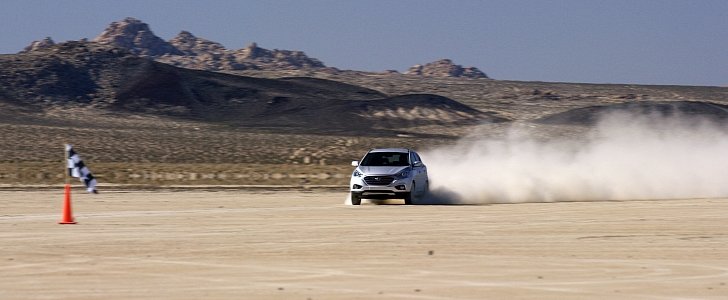The South Korean carmaker has just established a World Speed Record for a mass-produced fuel cell vehicle: the Tucson Fuel Cell managed to achieve 94 mph (152 km/h).
We're talking about a record set in a specific category of vehicles here: mass-produced fuel cell cars. Since there aren't too many models in this area of the market, it's easy to just step on the accelerator (the term gas pedal is obsolete for these cars) and let the car hit its top speed.
As mentioned above, Hyundai's new World Speed Record for Fuel Cell Vehicles stands at 94 mph, the equivalent of 152.2 km/h. This isn't a massive figure by any measure, but the Hyundai model is the first mass produced FCV ever to reach this threshold.
As always, other manufacturers are expected to start trying to surpass this figure, and considering the rate at which Fuel Cell Vehicle technology is evolving, it would not be inappropriate to expect Nurburgring record attempts for this kind of vehicles in the near future.
The Hyundai Tucson FCV set this record in the Soggy Dry Lake Bed of the California desert. The achievement comes 18 months after the first Tucson FCV was delivered to its owner in Southern California. With an EPA-estimated driving range of 265 miles (426 kilometers), the fuel cell crossover could be a pretty good alternative to a normal EV that needs to be charged from an electric socket.
For now, the Tucson FCV is only available in certain markets. In the US, Hyundai only offers the model in the Southern California region, a testbed for other manufacturers that experimented with fuel cell vehicles as well. One of the pioneers of this type of technology in this specific region is Honda, with its FCX Clarity.
According to Hyundai, the Southern California region currently has the greatest concentration of hydrogen refuelling stations in the United States of America. Nearly 50 such stations are forecast to be operational in 2016.
As mentioned above, Hyundai's new World Speed Record for Fuel Cell Vehicles stands at 94 mph, the equivalent of 152.2 km/h. This isn't a massive figure by any measure, but the Hyundai model is the first mass produced FCV ever to reach this threshold.
As always, other manufacturers are expected to start trying to surpass this figure, and considering the rate at which Fuel Cell Vehicle technology is evolving, it would not be inappropriate to expect Nurburgring record attempts for this kind of vehicles in the near future.
The Hyundai Tucson FCV set this record in the Soggy Dry Lake Bed of the California desert. The achievement comes 18 months after the first Tucson FCV was delivered to its owner in Southern California. With an EPA-estimated driving range of 265 miles (426 kilometers), the fuel cell crossover could be a pretty good alternative to a normal EV that needs to be charged from an electric socket.
For now, the Tucson FCV is only available in certain markets. In the US, Hyundai only offers the model in the Southern California region, a testbed for other manufacturers that experimented with fuel cell vehicles as well. One of the pioneers of this type of technology in this specific region is Honda, with its FCX Clarity.
According to Hyundai, the Southern California region currently has the greatest concentration of hydrogen refuelling stations in the United States of America. Nearly 50 such stations are forecast to be operational in 2016.




